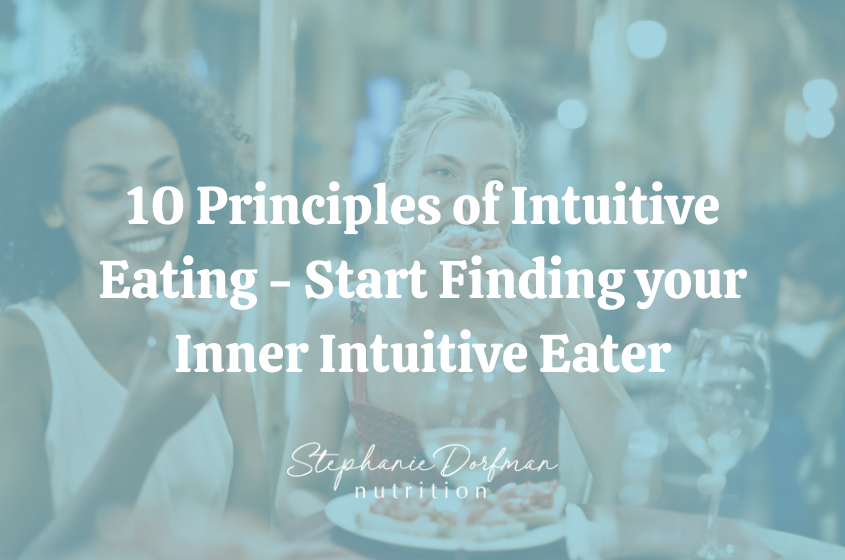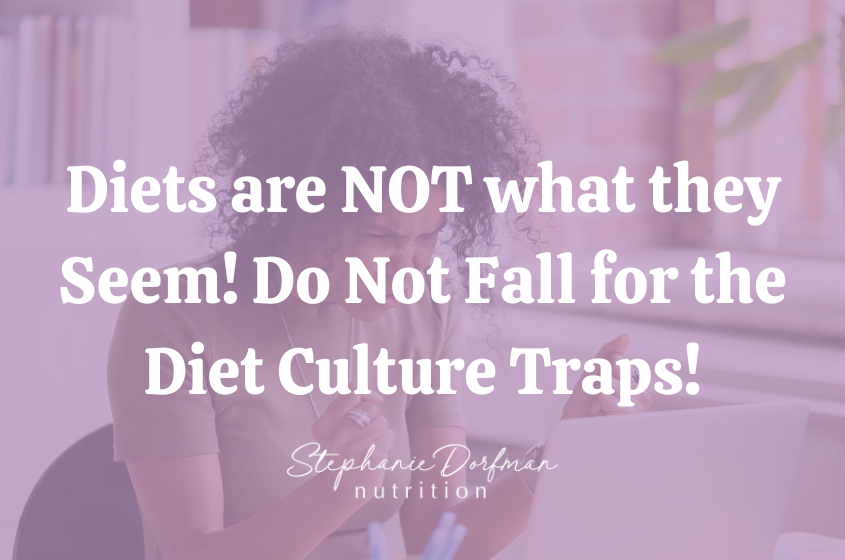Here they are! The 10 Principles of Intuitive Eating explained in one place. So dive in, see which principle resonates the most with you – right now, and start learning how to eat intuitively.
**Friendly Reminder** Use these principles as intuitive eating guidelines! They are not meant to be followed in order — unless that is how you intuitively feel and naturally progress.
1. Reject the Diet Mentality
So, how do you reject the diet mentality? First off, I’m sorry to break it to you, but the “quick fixes” that diets promise DO NOT WORK. The first step is acknowledging there is a problem – and that problem is DIETING. Don’t fall into the trap!
- The sooner you let go of the hope for one last successful diet – the better your relationship with food and yourself will become!
- It may be scary to “just eat” and not follow any strict food rules – but don’t knock it till you try it! Consider it a big experiment.
- Give it some time and see how it goes! The diet industry should not control your life or food choices.
2. Honor your Hunger
Hunger signals appear differently for everyone and is biologically NATURAL. Hunger is not the enemy!!
- Hunger could feel like a rumbling belly, lack of concentration, feeling sluggish, etc.
- To help yourself connect with these hunger and fullness cues – monitor your feelings of hunger on a scale of 1 (so hungry I will eat anything) to 10 (so full I need to lie down) before meals/snacks.
- With more focus and attention, I bet you’ll start hearing these cues more often.
- Honoring your hunger is a function of self-care – so plan ahead and be prepared for when hunger strikes.
- Keep nourishing, satisfying, and easy to prepare foods with you (in your house, office, bag…) so you know you always have a yummy snack/meal option.
3. Make Peace with Food
This principle mentions the critical step of giving ourselves unconditional permission to eat. But what does that really mean? How can we be at peace with food? Giving yourself permission to eat all foods is the first step to healing and trusting your relationship with food and your body.
- No food is good or bad – food should not be described with moral values.
- All food choices should be considered equal — emotionally, based on taste, listening to hunger/fullness, no shame, no judgement!
- When certain foods are restricted we get into a cycle of….restricting ➡️ craving ➡️ bingeing ➡️ restricting (start again).
- By allowing all foods to fit into your life, you take the power away from those restricted foods.
- I acknowledge that this is a tough and scary process. It goes against everything diet culture has told us.
4. Challenge the Food Police
The “food police” are those negative, guilt ridden voices in your head that try to take control. DON’T LET THEM WIN! As a human – we are not good or bad based on what we eat. Diet culture THRIVES on the food police! If we “break a rule” or “fail a diet” we often look for the next “rule” or “diet” to follow. Only YOU know what is best for you – not the food police.
Just for fun – consider these questions:
- Wouldn’t it be simpler and more enjoyable to eat foods we prefer and like to eat?
- Where did these rules come from?
- Are they based on scientific evidence?
5. Discover the Satisfaction Factor
Is there a difference between feeling full and satisfied? Yup – sure is! You know that feeling when you eat a meal and you say “that hit the spot!” That is satisfaction.
- If the food police or diet mentality are still present, it may be difficult to find that “hit the spot” food.
- No matter how much (for example…) salad or popcorn you eat, if you were actually craving pizza, you may feel full, but not satisfied.
- Just to note – every meal you eat will NOT be the most satisfying meal of your life – and that is OK.
6. Feel your Fullness
If we consider meal times an opportunity to check things off our list (I have definitely had meals like this), we will miss important body cues – like the feeling of fullness.
- Finishing the food on your plate does not always mean you are full. There may be a few reasons why we feel the need to clean our plates, but it’s helpful to understand that just because our plate is empty, does not mean our bodies are full (also just because our plate is NOT empty, does not mean our bodies are still hungry).
- Try staying in tune with your body, come off autopilot, and make the decision to keep eating or stop eating based on your internal cues.
- Making peace with food (throwing it back to principle #3) is an important step toward feeling your fullness.
- Once you give yourself the permission to honor your hunger (woah and principle #2) and know you can eat any food at any time when hunger strikes, your internal cues will start speaking louder and prouder.
7. Cope with your Emotions with Kindness
When things happen that test our emotions and mental control, it’s important to learn how to move forward with kindness. In general, eating can be an emotional experience – celebratory, comforting, relaxing, rewarding. Food is part of both happy and sad occasions. And – let me just say….emotional eating is OK!!
Diet culture has villainized emotional eating. When you are feeling the need to cope with your emotions using food – ask yourself these questions:
- Are you feeling biologically hungry?
- What other feelings are you feeling?
- What else may you need (in addition or besides food)?
- Do you need help with something?
When we figure this out, it will be easier to determine how to move forward with a coping mechanism.
So, instead of turning towards food (which again, is ok!), how can we better meet our emotional needs with kindness?
8. Respect your Body
All bodies are GOOD bodies and deserving of care. The problem isn’t you or your body. The problem is the fatphobic culture we are surrounded by that promotes thinner is better, smaller is healthier – which is NOT the case.
- There is NO perfect body type, there is NO perfect look, there is NO perfect way to eat – if we all ate and moved the same, we would all still look different – this is not a “one size fits all” situation.
- This principle emphasizes body respect and to value all that your current body does! You don’t have to like every part of your body, everyday, all the time in order to respect it.
- Even if you are having a bad body image day, you still have to treat your body with dignity and meet its basic needs: feed it, dress it comfortably and with a style that makes you feel good, and move it in ways that bring you joy.
- Remember – WEIGHT IS NOT A BEHAVIOR – being able to focus less on the number on the scale (or clothing size) and more on internal beliefs and behaviors will allow you to feel more free and continue on your path to become an Intuitive Eater.
WEIGHT IS NOT AN INDICATOR OF HEALTH – read my other blog post here
9. Movement – Feel the Difference
Focus on how the movement feels. If you are only focusing on the “end result” like burning calories or getting in shape, you may miss all of the physical and mental benefits of exercise. It’s time to break-up the relationship between exercise and weight loss!
- At the end of a workout, we should feel an appreciation for our bodies that we were able to complete the activity.
- Movement has a TON of health benefits (not including weight loss….). Moving on a regular basis can help improve sleep habits, reduce stress, improve bone strength, and reduce the risk of many chronic illnesses.
- Moving also improves our mood, energy levels, and cognitive function.
Find activities that feel good for YOU and appreciate the body that allows you to do them.
10. Honor your Health with Gentle Nutrition
When we are starting our own Intuitive Eating journey – it is necessary to free our brains from weight goals and nutrition education.
- NO this does not mean Intuitive Eating does not care about the nutritional quality of food.
- NO this does not mean Intuitive Eating does not value health.
Discussing nutrition as it relates to health comes later in the Intuitive Eating process because without a better relationship with all foods and your body, it’s tricky to honor your health with nutritious foods. You need to consider what makes your body FEEL good without the thought of nutritional value.
Food should be pleasurable! If eating healthful foods and fun foods is an enjoyable experience AND makes you feel physically good – you are more likely to take this principle to heart and continue honoring your health with gentle nutrition.
Balance is important!
So friends – I leave you with this (until the next blog or Instagram post about Intuitive Eating)…
Savor your meals without guilt.
Choose your foods based on taste and feeling.
There is no such thing as a “perfect eater.”
What you eat does not impact who you are as a person!
If you’re ready to get started on your Intuitive Eating journey –
Check out 5 Ways to Unlock your Inner Intuitive Eater (free download!)
The download walks you through 5 challenges – focusing on an Intuitive Eating Principle – to get you thinking about how you can ditch diet culture in your everyday life. Things like – focusing less on numbers and more on behaviors, or paying more attention to your internal cues, rather than external ones.






